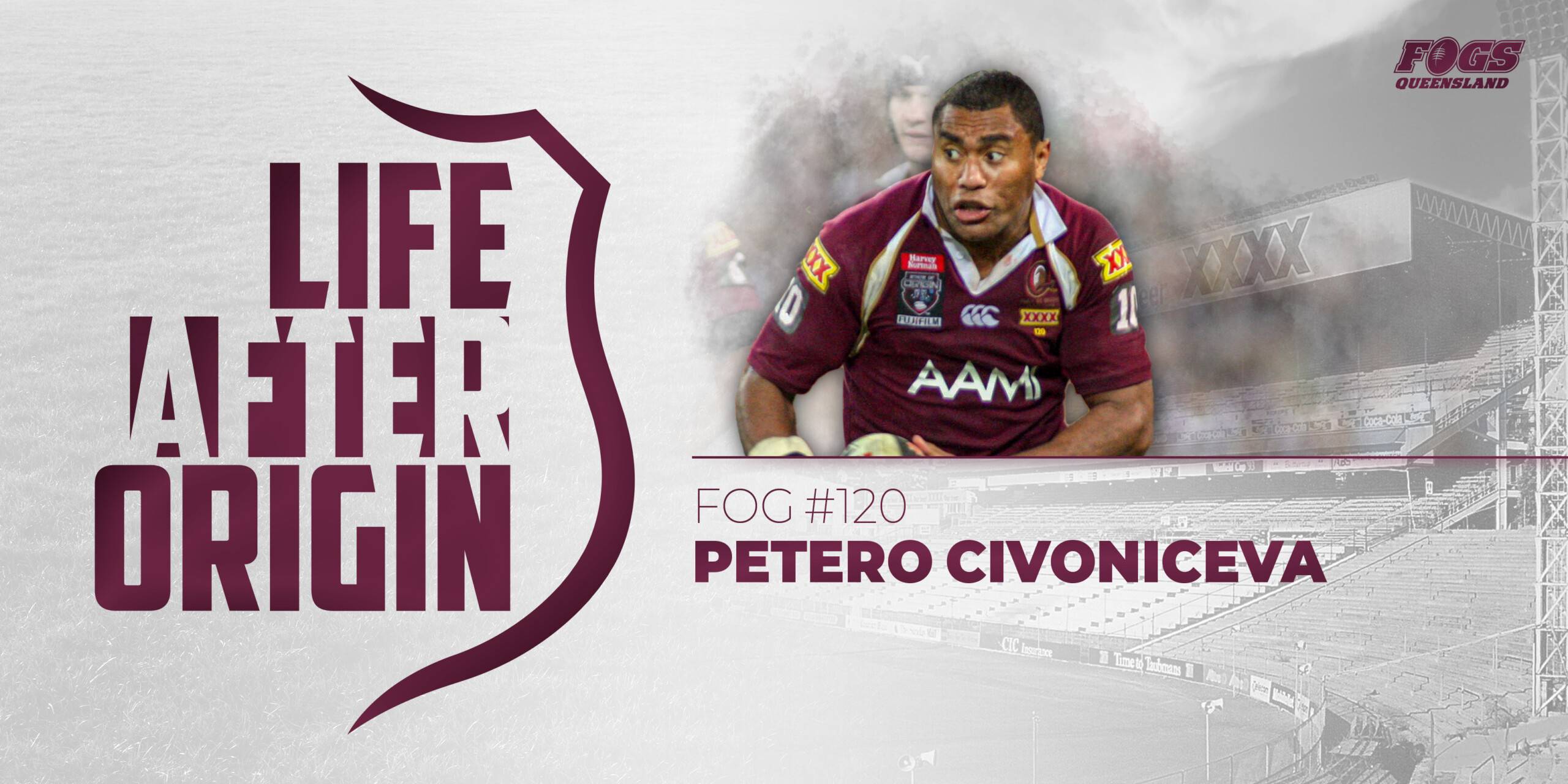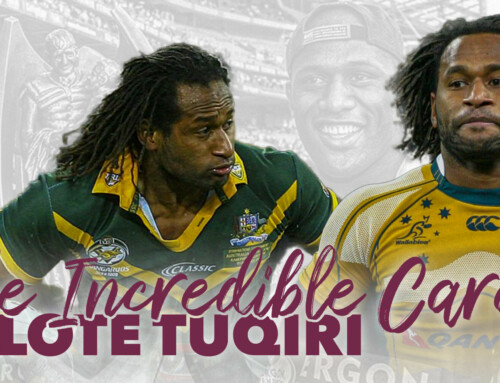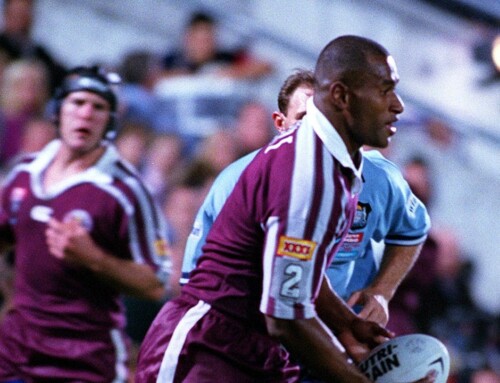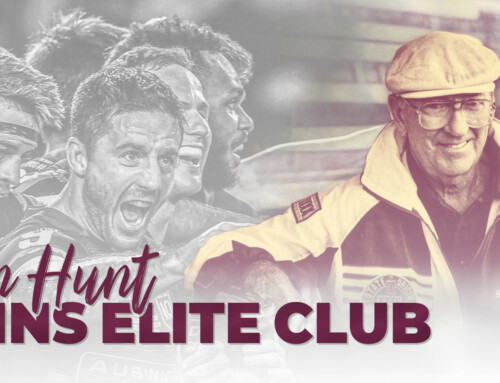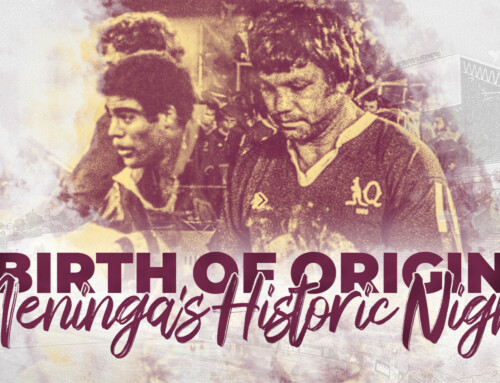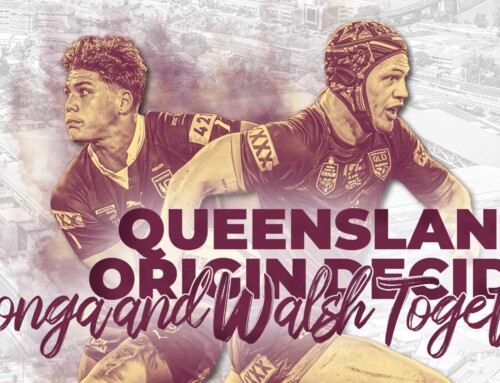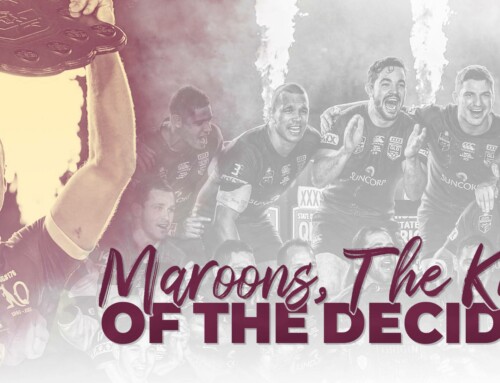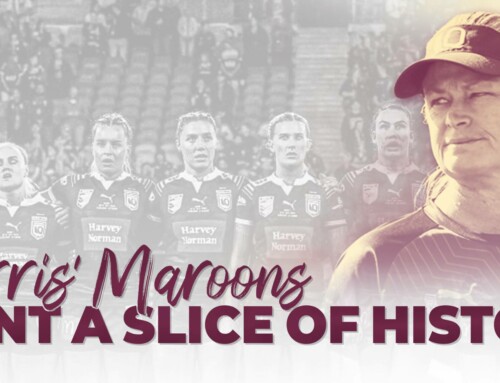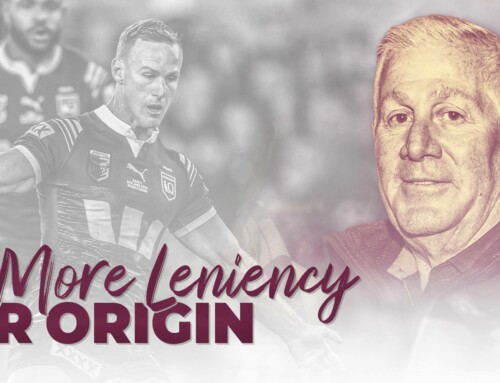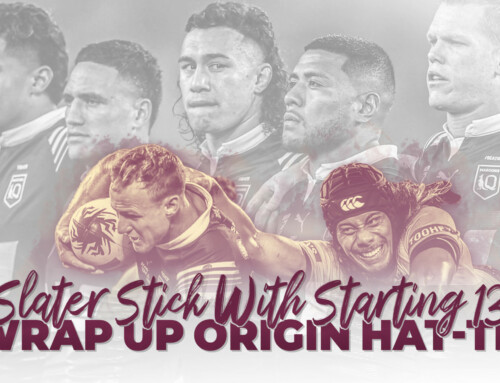By Wayne Heming
During his playing days, Peter Civoniceva was an enforcer, an intimidator who commanded plenty of respect.
But since hanging up his boots in 2014, after fulfilling a lifetime dream of playing for Fiji, FOG #120, has taken on a new persona as “The Ambassador” promoting the game and its causes far and wide.
Now, instead of knocking over big rivals with his powerful 193cm frame, Civoniceva has several projects that keep him heavily involved in the game that is in his DNA.
He is a full-time Ambassador and one the faces of the “Deadly Choices” program, a campaign that strives to empower Aboriginal and Torres Strait Islander people to make healthier lifestyle choices for themselves and their families.
He works for the Brisbane Broncos, his first NRL club, on game days also is an ambassador for the QRL and is a proud member of the Former Origin Greats (FOGS).
He is actively involved in promoting the game and pathways for young players in Fiji to help them play rugby league.
Civoniceva’s passion for rugby league, Queensland, and Fiji, where he was born before moving to Queensland at a very young age, still drives him to tackle those projects which are close to his heart.
He has kicked off his own rugby league club in Fiji who’ve already qualified to play in the NSW Jersey Flegg competition in Sydney in 2025..
His is the chairman of the Kaiviti Silvertails RLFC in Fiji, a group of young men under 21, who he hopes will showcase the talent of the Pacific Island nation against the best youngsters from NRL clubs in 2025.
“It all started from talks I had in 2013 when I was in Fiji, and I have pulled it off,” said Civoniceva.
“We now have 10 high-performance gyms in Fiji which myself and my partners have put together to allow local kids to train in top-class facilities under our banner.
“I’ll be flying a young team of Fijian players to Sydney every fortnight next year to play in the Jersey Flegg comp.”
Civoniceva had a magnificent career for Brisbane, Queensland, and Australia in between a few seasons with Penrith following a falling out with Broncos coach Wayne Bennett in 2007.
Some 400 first grade games, 33 Origins for Queensland, a record 45 Tests for Australia, until Cameron Smith broke his mark with an astonishing 56 games for the Kangaroos, during a 16-year career playing a position which required the ultimate 80 minutes every single game.
He was the cornerstone, firstly with Shane Webcke up front for Queensland, before forging a magnificent bookend partnership with Steve Price for many years in Maroon.
The FOGS caught up with Civoniceva recently and that big fella was more than happy to chat about his career and a few projects he has on the drawing board.
Q: So Pet, you signed off your amazing career representing your birth country Fiji a decade ago, how special was it to finish your playing days that way?
Petero: I had retired from the NRL and I went back and played for Redcliffe in 2013. During the year Rick Stone, who was coaching Fiji at the time, approached me about playing for Fiji in the 2014 World Cup which I did. It was an amazing experience.
Even though I’d retired from the NRL I thought it was a wonderful way to honour my heritage, my parents heritage. To go back to Redcliffe and be able to thank all the people who had helped me along the way. I never thought I’d get a chance to play for Fiji after I missed the chance in 2000 when I broke my arm playing for the Broncos and Wayne (coach Wayne Bennett) advised me against playing and to prepare for season 2001. I went on the play for Australia for many years and thought the Fiji dream had passed me by. It was a wonderful way to end my career, it was something special for me and my wife Bonnie and my kids.

Q: Is it true you could have played for the Sydney Roosters instead of Brisbane had some things fallen into place?
Petero: Before the Broncos came knocking Arthur (Beetson) asked me if I’d be keen to play for the Roosters. At the time my mum was a single parent and she couldn’t really afford to move to Sydney and Beetson understood. It wasn’t long after that (the late) Cyril Connell dropped in at our house and I was a Brisbane Broncos. I knew Beetson because I played much of my junior football with his son Mark at Redcliffe. I remember there were two gentlemen Redcliffe, Brian O’Brien (Clinton O’Brien’s father and Brian Winney who ran the Dolphin’s junior development squad in the early 1990s). They were well ahead of their time and a lot of us, like Clinton O’Brien and Danny Nutley, all went on to play Redcliffe and progress into the NRL.
Q: You played over 400 senior games in a position which required you to be aggressive and intimidating. How many times were you sent off in your career?
Petero: I remember I got into a bit of trouble at the Broncos because I was overly aggressive early. I got sent off in a Colts game and Wayne (Bennett) happened to be at the game. He pulled me aside after the game and reminded I was no good to any team if I was sitting on the sidelines suspended. He had a really good talk to me about playing with more discipline and controlled aggression. After that conversation, I think I got sent off once in my career after our halfback Scott Prince got hit late off ball and I got a bit riled up a bit.
Q: Didn’t you get sent off playing for Penrith in 2010 and missed a qualifying for final after being suspended for two weeks?
Petero: Yeah I did and it was a costly one too because we qualified for the finals and I think I missed the first one. It was something I prided myself on, being tough but being disciplined which was exactly what Wayne told me all those years before. I could be tough but play with controlled aggression. He told me if I could control my aggression and put a good shot on a player, that was the best way or I could run with aggression and hurt blokes that way.

Q: Your played for a long time in an era of great front-rowers, who did you find the hardest or toughest to go up against?
Petero: I made by debut in 1998 up against David Fairleigh, Billy Moore, and Gary Larson playing North Sydney. My second game was against the “Chief” Paul Harragon against Newcastle which was a huge game because it was Super League versus the ARL. These were guys I idolised as a kid and I was playing against them. You quickly understand the standard of what it takes to be a forward, especially in the front row. My first year (he won the Broncos rookie off the year and came off the bench in the club’s grand final win) was a massive learning experience for me. There were a lot of top front-rowers along the way, Reuben Wiki, my old Origin partner Steve Price, and Martin Lang, he was tough and relentless and asked a lot of questions of you because you knew he was never going to take a backward step. I could go on. Then along came the Jason Ryles and Luke Baileys, who were big and mobile, I had to adapt my game again because it was getting quicker.
Q: Every time Origin rolled around in the mid-to-late 2000s both you and Steve Price were labelled “Dad’s Army” by the southern media who did their best to pension you both off but you kept making them look silly?
Petero: Pricey was just amazing. I debuted in 2001 and Pricey had been out of Origin but was recalled when Shane Webcke left. it was Pricey and I together and it was a fantastic partnership. I owe a hell of a lot to Pricey for his leadership and friendship. We had so much success (for Queensland) in a Maroon jumper which made it even more special. I think we both understood our role in the team. We copped some criticism just before the 2006 series but then that amazing generation of Queensland players came through and we were able to go on that incredible stretch of wins. The “Dad’s Army” jibe motivated me and Pricey, we loved it.

Q: Do you have a favourite memory or moment from your Origin career you can share?
Petero: There was one, when I debuted in 2001. The players had heard the rumours going around that Wayne (Bennett) had pulled off a coup and was bringing Allan Langer back for the decider but we were kept in the dark a bit. For all of us young blokes who had been called up it was very exciting. That moment when Alf popped his head out of yellow cab and jumped onto the team bus I remember there was this amazing feeling of calmness over the team knowing he was back. We had such an amazing week and Alfie played out of his skin and won man-of-the-match and the rest is history. It was a masterstroke from Benny and Alf, as he always did for Queensland or anyone he played for, delivered big time on the night.
Q: We here all these stories about Alf being the team clown and life of the party, what was it like being out with him after a game.
Petero: Nobody could get anywhere near Alf when it came to having a good time. Alfie was the ultimate team man. He and Kevvie (Walters) packed a one-two punch when they were having a good time. But as much as they loved clowning around you couldn’t get two more competitive blokes which is why they are both champions. They shared in such a wonderful playing partnership together. They bled passion and they had an aura about them. That’s one thing I do miss is those good times after a match with Kevvie and Alfie.
Should Alfie be an immortal in your humble opinion?
Petero: There are a few players, say Ron Coote and a few other former champions who deserve to be recognised. People are talking JT (Johnathan Thurston) and Cameron (Smith), but they can wait a few more years, we need to honour our former greats who are getting into their senior years like Ron Coote. We need to see them recognised while they are still with us. Alfie deserves to be an immortal.
Q: Is it true before the third game of 2006 with NSW threatening to make it four-in-a-row, coach Mal Meninga called a few of the senior players aside and told them he couldn’t guarantee their Maroon jumpers in the future if Queensland lost?
Petero: Yes he did. It was a very confronting conversation. Mal got myself, Locky (Darren Lockyer) and Pricey (Steve Price) into to room and sat us all down and basically laid it all on the line. His message to us was that if we lost, he couldn’t guarantee our places in future Queensland teams. He virtually said he couldn’t do much more for us and that the only thing that would save our careers was a win. I think Mal was directing his comments mostly at Pricey and I, I think Darren was pretty safe. Pricey and I knew the writing was on the wall, it was late in our careers. It was on us, we were front-rowers, we had a job to do. The criticism in the media was warranted. You can get a bit emotional at the times and you think it is unfair, but at the end of the day it was exactly what we need to get us motivated. It proved to be the win that led Queensland on it’s amazing streak of series wins.
Q: Speaking of the eight-in-a-row streak how was Queensland able to pull that off under Mal Meninga between 2006-2013?
Petero: There was just something special about the Queensland spirit. We had great staff of blokes like Choppy (Chris Close), Steve Walters, Gav Allen, and the Godfather, Dick “Tosser” Turner who all played a part in building that dynasty. So many FOGS, from Arthur Beetson in game one in 1980, to Cameron Smith, have played a part in building the Queensland spirit to where it is today. Queensland has got an aura and it’s because of all those FOGS who have come before us. Even today you have got so many FOGS on the coaching staff driving that spirit.
Q: You mentioned Dick Turner what kind of a relationship did you have with Tosser, both being from Redcliffe?
Petero: Tosser was the Godfather of Queensland rugby league and an integral part of the Origin spirit. The players always loved Tosser having the final word before we ran out onto the stadium, they were always very poetic and wise words. He was simply an amazing man and a huge part of Maroons folklore. Being a Dolphin I had a special connection with Tosser and I always felt like he had a soft spot for me. The wonderful thing about Tosser was he would always give you his time and what I loved about him was he would always stop you and ask how you were and asked about your family. He was someone who cared and he had a presence and an aura about him. He was Queensland right to the very end, coming into the sheds in a wheelchair after we won the second game in 2008, a few days before he passed away. It meant a lot to the boys and we made sure we honoured him by winning the series decider in Sydney a few weeks later. It goes to show it’s not about the coaching or the individual, there is a culture there that you buy into that is very powerful and these influential men, like Tosser, started it all and led us to where we are now. When you pull the Queensland jersey on, you owe it to all of those before us to live up to the standard.
Q: You didn’t leave Brisbane to go to Penrith on very good terms with Bennett, are you guys on speaking terms, is there any bad blood between you?
Petero (Laughing loudly): I haven’t seen Wayne for a long time although we were both at Carl Webb’s funeral recently. Water has passed under the bridge. Wayne’s moved on and I’ve moved on and it is what it is. It would be good to catch up with Wayne and chat to be honest. We haven’t spoken about what happened. I only live around the corner from Dolphin Stadium so I should probably drop in and say hello and have a coffee. I can never understate the impact Wayne had on my life. He gave me a start and thank god he and Cyril (Connell) saw something in me and if it wasn’t for those two blokes I wouldn’t have the career that I had. There’s not a day that goes by that I am not grateful for the role they both played in my career.

Q: So finally Petero what memories do you cherish most from all those Origin games you played?
Petero: The bonds you make with teammates. We had a special group of players (2006-2012). It’s amazing when I do run into the boys from that era, it’s wonderful to reconnect again because it was an experience you will never forget for the rest of your life. What we had as a group was very special. When you walked into an Origin camp you knew you were around family, that’s how it felt, we were all brothers, we had a genuine maroon brotherhood going that we all bought into and it was our point of difference. As good as New South Wales was in each of those years, we had something else, that little bit of extra in our DNA to win. We understood it wasn’t about us, it was about the people who loved this (maroon) jersey, the people of Queensland. To a man we understood that and it was about being prepared to do whatever it took to make Queenslanders proud.


